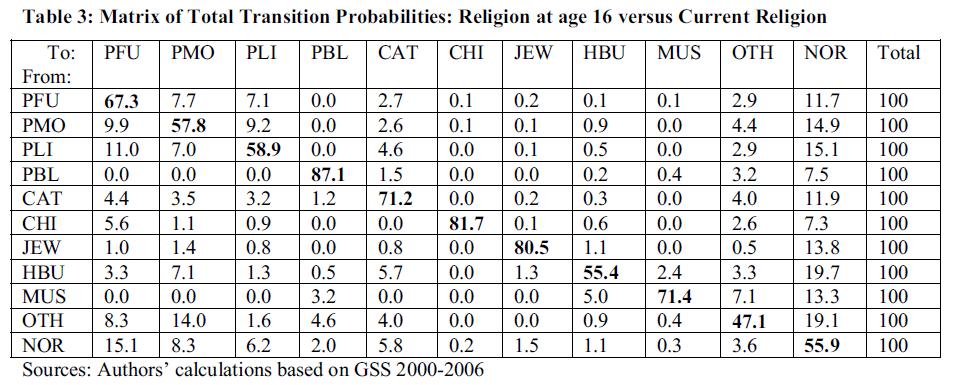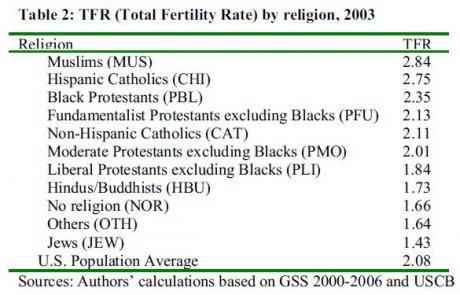 Behavioral economist Bryan Caplan published an essay in the Wall Street Journal on Father’s Day that begins: “Amid the Father’s Day festivities, many of us are privately asking a Scroogely question: “Having kids—what’s in it for me?” An economic perspective on happiness, nature and nurture provides an answer: Parents’ sacrifice is much smaller than it looks, and much larger than it has to be.”
Behavioral economist Bryan Caplan published an essay in the Wall Street Journal on Father’s Day that begins: “Amid the Father’s Day festivities, many of us are privately asking a Scroogely question: “Having kids—what’s in it for me?” An economic perspective on happiness, nature and nurture provides an answer: Parents’ sacrifice is much smaller than it looks, and much larger than it has to be.”
The article proceeds to explicate, but never escape, this initial fudge: that is, the strongest recommendation that an economist can muster for having children is that it’s not as much work as people think. This is not to say that it’s not work – just that parents don’t have to be as anxious as they are about their children’s futures, since almost the entirety of their fate is the consequence of genetics (he does generously suggest that parents shouldn’t shut their children up in closets). Little hinges on whether or not parents read children bedtime stories every night, or even what schools to which they are sent or the neighborhoods in which they live. According to Caplan’s summary of recent behavioral science findings,
If you enjoy reading with your children, wonderful. But if you skip the nightly book, you’re not stunting their intelligence, ruining their chances for college or dooming them to a dead-end job. The same goes for the other dilemmas that weigh on parents’ consciences. Watching television, playing sports, eating vegetables, living in the right neighborhood: Your choices have little effect on your kids’ development, so it’s OK to relax. In fact, relaxing is better for the whole family. Riding your kids “for their own good” rarely pays off, and it may hurt how your children feel about you.
However, what begins as a fudge becomes full fledged misdirection as the article proceeds. In spite of Caplan’s insistence that upbringing matters only nominally in how one’s children will ultimately turn out, Caplan notes one area in which parental influence is extremely important: beliefs. According to Caplan, “Parents have a strong effect on which religion and political party their kids identify with”; yet he goes on to state, notwithstanding these acknowledged areas of influence, that parents have “little [influence] on their adult behavior or outlook.” This is a remarkable off-hand conclusion, following directly upon his admission that parents significantly influence “religion and political party.” These matters appear to be superficial for Caplan’s purposes, apparently of little consequence for “adult behavior and outlook.”
Yet, it turns out that one’s religious upbringing (or lack thereof) exercises considerable influence on one’s religion as an adult. Consider the table below, which traces the movement between various religions, from one’s upbringing (vertical column) to adulthood (horizontal column). If one looks at the bold diagonal column, one finds that in every instance but one (“Others”), a majority of adults still adhere to the religion of their upbringing.
(See the next table for the abbreviation key)
This continuity is important for many reasons, but one reason is of particular relevance to Caplan’s argument. For, it’s the case that one thing we know especially about one’s religion (or whether one has one) is that there is a strong correlation between being a religious adherent and having children. In the midst of an article purporting to persuade people to have more children (based on economic findings), he ignores the most evident piece of data that is likely to influence this decision: religiosity. That is, Caplan ignores a major factor that he ought to note in discussing the question of whether people have children: while there is no evidence that decades of behavioral economics influences that decision, there is overwhelming evidence that religious affiliation influences the decision to have children. Take, for instance, this data from a survey of fertility rates in the U.S. published in 2003:
This survey bears out what many similar studies have shown: in developed countries – and particularly the United States – those groups that are having children at or above replacement rates tend to be religiously observant. If Caplan were really interested in encouraging more people to have children, he would start teaching in Sunday school classes. It’s safe to conclude that arguments like Caplan’s – a lukewarm, desiccated and fundamentally uninteresting “defense” of having children aimed to appeal to Mr. Spock, and most noteworthy, that doesn’t once mention the word “love” – is unlikely to spur a large bump in “non-love babies” upon publication of his forthcoming book Selfish Reasons to Have More Kids. Indeed, it’s probably the case that Caplan and his libertarian, economistic ilk are aware that the demographics do not favor their breed.
This clever video is instructive of their likely future (and, note the nod to none other than Darwin himself, which a behavioral economist like Caplan should appreciate. Ironically, it’s contemporary Darwinians, exercising the freedom not to reproduce, who tend to have fewer children, certainly in comparison to religious believers. The latte tend to be more skeptical of Darwinian theory even as they behave in ways more
Darwinian than the Darwinians). In the end, the religious will inherit the earth, in spite of articles like this one that attempt to persuade the loveless to have more kids.














Interesting. I read that article by Caplan, found it quite disturbing, and wrote a response to it on my blog. I don’t mind self-promoting when it’s so topical, and I have pasted the first two and final paragraphs from my post below:
A rule of thumb in the study of history is that you usually find what you’re looking for, and the questions you ask largely define the answers you get. I like the basic conclusion of Bryan Caplan’s essay in the Wall Street Journal (“The Case for Having More Kids”). It’s Caplan’s basic premise that disturbs me.
Caplan is an economist at George Mason, and you can see the concept of self-interest splashed across his essay. He well displays why I revile extending economic arguments into all aspects of daily life and using economic theories as the basis for life decisions. The questions his article asks are extraordinarily selfish (enlightened self-interest here, as in many places, looking extraordinarily like brutish selfishness), and thus some of the conclusions of the article are strikingly inhumane and coldly deterministic.
[…]
A still deeper assumption underlines not only this article but also the entire enterprise of expressing human behavior in scientific laws. Caplan asks, “Are we determined by genetics or environment?” Obviously he has never asked, “Are we determined?”
—
As an aside, I started to read an article in Slate just yesterday arguing that the uptick in childless women over the past three decades has less to do with abortion and more to do with women realizing that motherhood, and I do quote here, “isn’t all it’s cracked up to be.” The picture accompanying the article is a head shot of a fit, attractive early-40s women with sunglasses on her head in bathing suit. She’s smiling happily, looking like she’s never spent a day worrying about her kids or, for that matter, worrying about anyone but herself.
That video is clever?
This video (and maybe this article) “suggest” that it is “better” to have children than to not have children. Why? For selfish purposes… the extension or survival of one’s genetic line. How is this more altruistic than the fit 40 year old woman Mark describes?
Maybe that fit 40 year old woman treats her body like a temple and works with the poor and sick in the slums of Mumbai? I seem to remember the most influential of Christian thinkers (Paul) exhorting Christians not to get married. Or Jesus telling his followers that they had to “hate their family” to be a part of the Kingdom “family”.
Deneen is right about one thing: It is all about love. But what that looks like might be family, or it might be staying single and loving those who have less.
This, I think, is one of those instances where Porchers sometimes worship their own preferences and tendencies. This is the road of idolatry and one need only to look in the direction of an organization like “Focus on the Family” and Dobson to see where that dismal road leads.
beg an answer to the question?: “Why is having many children
So good point that I’ve read somewhere before on the Darwin thing.
The world should be grateful for the saintly people who devote their lives to the betterment of others. The Mother Theresas of the world do immesurable good.
Most of us, however, are not among their ranks. We are too selfish. The closest we come to true altruism is through the sacrifices we make for those close to us, particularly our children.
These acts benefit not only our off-spring, but the greater society in which they live and will one day be adult members. These acts also strengthen us because, when we perform them, we raise ourselves out of our everyday selfishness.
That’s not to say that there is no selfishness in parenthood. It can be as rife with it as can be any other part of this fallen world. But parenthood gives us a quotidian and extremely compelling reason to rise above our self-interest and self-regard.
And religion explains all this to us. It teaches that children are the natural expression of love and that they are a gift from God. It helps us to see that parenthood is a noble calling, probably the most noble one we’ll ever get. It teaches us that by rearing good, strong, right-thinking children, we can hope to help mend a broken world, including the slums of Mumbai.
Parenthood is a way to touch the hand of God and to help your children to do so, too, one day. It’s no wonder that religious people are more willing to answer this call. They can better hear it.
Jordan, you misuse Scripture because you misunderstand it. Scripture describes children as a blessing repeatedly. Likewise, marriage. It’s only because marriage and children are truly good that it is a sacrifice to give them up for service to the Lord as Paul indicates.
The problem is when society devalues marriage and children. To the extent that it does, rhetoric praising the forsaking of marriage and children as sacrifices for the kingdom of God are empty. If something is not a good, then there is no sacrifice in giving it up.
When Paul describes how it is better to be single, he is writing in a context that already recognizes the essential goodness of marriage and children; only then is it intelligible how forsaking them is a sacrifice. Our modern day context is obviously different in how it does not even understand what marriage is nor does it value children as gifts of God.
So, no, this is not one of those instances where Porchers worship their own preferences and tendencies, unless you believe it is a preference or tendency to recognize the essential goodness of children. Christians aren’t antinomian. Grace does not dissolve the moral order of Creation.
In the end, I suppose it comes down to how likely it is that the 40 year old woman you cite actually works with the poor and sick in Mumbai. Judging from the cultural landscape in America, I don’t think it’s very likely.
Well, Jordan, the Bible suggests that it is better to have children than not to, and the Bible suggests that the right way to have children is within the family. When Paul recommended that Christians not marry, he was recommending the most ascetic life in which God is our only love, our only companion. But, as experience and the Bible makes clear, this is not the path most people, even most Christians, will take. If one is not disposed towards pure ascetism, then marriage and child-rearing is in your future.
So, while you’re correct to say that a person who posseses and wants to show Godly love might show it by “staying single and loving those who have less,” I think you’re ignoring the fact that nearly everyone will eventually be married and have children. We’re then faced with the kinds of questions that Caplan and Deneen try to answer here, and it seems to me Deneen’s answer is the better one. If having children is only a question of taking care of your economic needs, then I don’t think there would be such a strong, biblically sanctioned, urge towards reproduction.
Studies do show that belief in the Bible has not been required to generate plenty of kids across history–across time and place. We’re victims of a kind of secularized Christianity–which views each human being (as the Christians do) as unique and irreplaceable. When Christianity was around, our being wasn’t basically biological, and so we didn’t sweat biological replacement. Now we’re in rebellion against the generation of replacements. And when we do have kids, we don’t raise them as future parents, as beings who will, in turn, generate biological replacements. (These generalities are in fact generalities, but they contain much truth.)
Peter’s right, the point about Darwinians not acting Darwinian is a Lawlerian point and should have been thus credited. Consider this a belated footnote, with apologies.
For the record, I don’t mean to pick on the “40-year-old woman.” The picture looked very much like a “file picture” of a smiling model, rather than a photo taken with a specific relationship to the article. The actual woman in question may very well be a mother of twelve.
But the clear intent of pairing that photo with that article was to contrast this happy carefree lady, with her good looks unravished by stress and child-birth, with the stereotypical image of the harassed mother pulled in seven directions at once, trying to take care of her selfish brats, too stressed and exhausted to lose her pregnancy pounds, pleasing her husband. Essentially it says, “Look at this happy lady. She only has to worry about herself. Would she be this relaxed if she had to think about children? Or other human beings?”
Mark,
I certainly understood your point and (without seeing the picture) your assessment of her character was probably accurate. I was just pointing out that being single isn’t always a selfish act.
And for the rest of you, I don’t think I misunderstand those Scriptures. I simply cited them to illustrate that there is another way to look at the issue. I agree about all of your points suggesting that marriage is a good thing, and family a blessing from God… I just think the video oversimplifies, and smells of a religious anti-Darwinian perspective. Darwin’s theory is sound as theories go, but it doesn’t explain Creation, nor mitigate the involvement or existence of God. Certainly there are reasons to be cynical about the ascendent “authority” of science in our secular culture… the same criticisms Deneen is leveling at Caplan can, and should be, leveled at almost every branch of scientific enquiry.
I just think it is important to affirm the value of having individuals who eschew family to pursue religious or vocational excellence.
There is a better and much more clever video somewhere on YouTube illustrating the same phenomena, but using it to explain why America is getting “dumber”. It shows trailer trash families having multiple children while a highly intelligent professional urban couple decide against having a family. Sadly I can’t find it. Maybe someone else who has seen it can help us all out.
It’s from Mike Judge’s film Idiocracy.
http://www.spike.com/video/first-10-minutes-of/2811209
And it continues…
http://www.spike.com/video/first-10-minutes-of/2811905
Jordan, I still don’t understand why you felt the need to point out being single isn’t always a selfish act, as if anyone wrote or implied it. Maybe I’m not sensitive enough to these things. By the way, that video was made by the folks at darwinrocks.de (Mission: “We combine music with evolution, which is not only fun, but might encourage you to think more about evolution.”) who really are sincere and not religious anti-Darwinians. Though the video is so hilariously awful I can see why you would have suspected parody.
didn’t want the footnote… appreciated the good use…
As I wrote here https://www.frontporchrepublic.com/2009/09/a-prayer-for-livia-grace/
The TV news shows that, because they’re childless,
Exercise, and avoid cigarettes and liquor,
Modern consumers live a life of poetry:
Controlled and self-absorbed as fits the office
Of sonnets or sestinas; their only daughter
An iPod or such ephemeral techno-language.
Albert,
Most likely it is my all too human tendency to project my own issues upon what I am reading. Either that or the unfortunate truth that the video’s silliness pushed my buttons and although I was somewhat aware of what you correctly point out, I was in a hurry for an appointment and only had a couple of minutes to comment.
I should have waited until later in the evening when I had more time to reflect and analyze the intent of both article and video, and time to craft a more precise response.
the strongest recommendation that an economist can muster for having children is that it’s not as much work as people think.
Actually, having children is a lot work (which is why they call it “labor”) especially if it’s in addition to all other work. Today, to have a child is to have two jobs, one as a producer/consumer and the other as a parent, and to have them precisely in that order. Not only must the second job not interfere with the first, but it can make no claims against the first (claims such as a “family wage” which would allow the parents to split the jobs.)
Of course, we can neither survive nor grow without children. Currently, economic “science” assumes that the economy can grow while the population shrinks simply by consuming more per capita. Moreover, with less time and resources spent on producing children we can spend more time producing and consuming other things. We will spend all of our time consuming things, while the state (acting in loco parentis) will give our children the care with a scientific precision not possible with real parents. In loco parents indeed: Education, child care, health care, etc., become “externalized costs” which instead of encouraging families discourage them. The utilitarian solution of course is to treat children as a consumer good in themselves, a locus in which the parents can display their wealth and caring, and where clothes that the parents’ figures can no longer fashionably accommodate can be displayed.
It may be true that “while there is no evidence that decades of behavioral economics influences that decision, there is overwhelming evidence that religious affiliation influences the decision to have children” as Dr Deneen writes, but it is also true that one’s beliefs about one’s immediate and especially future economic situation will have a significant influence on whether one has children. An easily accessible (well, it was accessible to me, anyway) article from the Pew research center can be found here: http://pewsocialtrends.org/pubs/753/american-birth-rate-decline-linked-to-recession. To summarize, the research shows that birthrates decline significantly during period of national (and indeed, statewide) economic upheaval, and poll responses indicate that uncertainty about one’s future economic position acts as a significant disincentive for couples to reproduce.
I’m not sure whether the study of behavior based on economic beliefs is what ‘behavioral economics’ consists in, but I think that a friendlier reading of Mr Caplan’s piece might show that he’s attempting to offer some falsifying data for the belief that having children is imprudent during times of economic uncertainty. In short, if a couple believes pregnancy imprudent because they are uncertain as to how much of their time will need to be consumed economically (that is, looking for work, working increased hours at a lower-paying job, etc.) and how much parentally, they can rest assured that the parental time is likely far less than much of the conventional wisdom (read every night, be home for dinner, what have you) suggests. And the degree to which such beliefs are (according to Caplan) false just is the degree to which such beliefs shouldn’t motivate people not to have children–and the data suggests that they are.
And there, it seems to me, is the crux: if people are influenced to have children (or marry, etc.) by economic considerations, it’s not obvious to me that their decisions are somehow made ‘lovelessly.’ Quite the contrary, in fact. If one believes justifiably that one has a significant likelihood of not being able to provide for one’s family should one have children, isn’t it the very concern for the child’s well-being (a la, love) that motivates the couple not to reproduce?
But perhaps this misses Dr Deneen’s criticism. A premise in Caplan’s argument is that parents do little to influence their children, save for their children’s beliefs. But, as Dr Deneen points out, beliefs influence a great deal about how the children will behave when adults, so (ex hypothesi) parents have a great influence on their children. Ok….but that’s not what de-motivating people from having children; in fact, it’s the opposite: people are demotivated precisely because they believe their behavior has too much influence on their children, and given their inability to provide appropriate attention/resources to influence the children properly, they shouldn’t have them. So, if what Dr Deneen writes, that people have a great influence on their children, then (fair enough) people who’ve been demotivated to have children by economic concerns can take no solace from Caplan. But neither will they be motivated to have children–which, it seems, works against the conclusion Dr Deneen favors. So, just maybe, the religious won’t inherit the world, after all–those insulated from economic worries will.
Children are their own reward. To abjure them on the basis that they require “too much work” is only to be expected by this technocratic age of magic supply……… when work, something divorced from entertainment of course…entertainment being reduced to “fun”…..when work is reduced to a pejorative.
One of my best kitchen fist fights was with my own son. Even the Dog got in some shots and when the Concept started banging us with a colander and screeching like a banshee, why, one simply cannot conjure the sublime quality of such an event. Obviously, the writer aint never gone best of three with his own kid/s.
When I forego reading books to my toddlers tonight, I’ll take comfort that a libertarian economist from GMU has studied charts that show my decision to watch a little more TV and ignore the tots won’t impact their future college, or whether they commit crimes, etc. ‘Cause that’s the point.
Comments are closed.